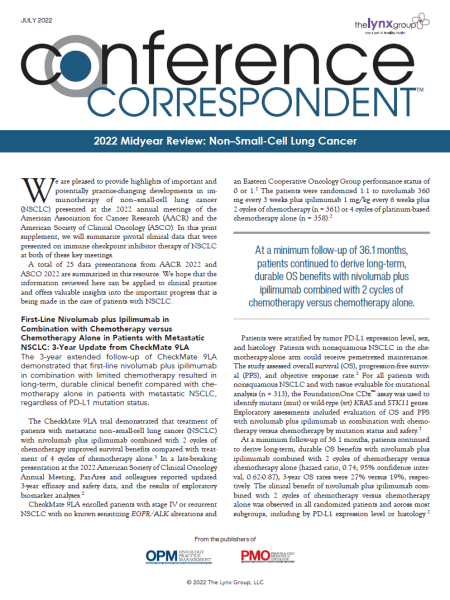Previously untreated patients and those who had received prior intracranial radiotherapy responded to selpercatinib treatment.
Patients with RET fusion–positive non–small-cell lung cancer (NSCLC) have a 50% lifetime risk for developing central nervous system (CNS) metastases. Selpercatinib is an oral RET inhibitor with CNS penetration properties that has been shown to have intracranial antitumor activity in an orthotopic RET fusion–positive preclinical model. The registrational phase 1/2 LIBRETTO-001 trial evaluated selpercatinib for activity in RET fusion–positive patients with NSCLC and CNS metastases in a prespecified subgroup analysis.
The global trial encompassed 89 sites in 16 countries and enrolled patients with RET-altered solid tumors, including RET fusion–positive patients with advanced NSCLC and baseline CNS metastases. Patients were given a 160-mg oral dose of selpercatinib twice daily in a 28-day cycle. Patients were assessed for CNS metastases by magnetic resonance imaging/computed tomography scans at baseline, followed by every 8 weeks for 1 year and subsequently every 12 weeks. The primary end point and secondary end point, assessed by an independent review committee (IRC), was the intracranial objective response rate (ORR) and intracranial duration of response (DOR). The cutoff for the study was June 17, 2019, and patients were required to have ≥6 months of follow-up from the first dose to be included in the efficacy analysis.
A total of 79 RET fusion–positive patients with NSCLC and baseline CNS metastases were enrolled in the trial. The IRC determined 22 of the 79 patients to have measurable (≥10 mm) CNS disease, and 14 of these 22 patients had adequate follow-up time to be included in the efficacy analysis. The 14 patients had a median age of 64 years (range, 43-80 years), had prior systemic therapy, and an Eastern Cooperative Oncology Group performance status 0/1 (21%/79%). Five of the 14 patients had intracranial radiotherapy more than 2 months prior to the selpercatinib treatments. Thirteen of 14 (93%) patients had intracranial ORR, including 2 patients (14%) with complete responses and 11 patients (79%) with partial responses. The cohort had a median intracranial DOR of 10.5 months (95% confidence interval, 6.7-not estimable). Among the patients who showed responses to selpercatinib, 5 patients had CNS progression events, 1 patient died, and 7 patients had ongoing and censored results.
The authors concluded that selpercatinib shows antitumor activity in patients with RET fusion–positive NSCLC and CNS metastases, and that these responses are durable, independently confirmed, and observed in patients with prior treatment.
Reference
Subbiah V, et al. J Clin Oncol. 2020;38(suppl 15):Abstract 9516.

